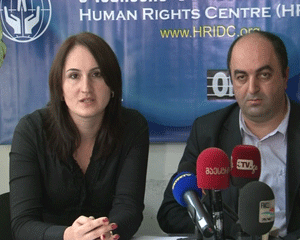Salome Achba
The press-conference in the office of the Human Rights Center on October 4 was dedicated to the inadequately strict verdicts passed by the common courts of Georgia. At the press-conference the human rights defenders discussed the concrete verdict passed by the judge of the Tbilisi City Court Badri Kochlamazashvili on September 28. Kochlamazashvili sent the young people wounded in front of the Technical University a year ago to prison for 3,5 years and imposed fine of 3 000 GEL on each of them.
The Human Rights Center has made a special appeal at the press-conference (full text of the appeal http://humanrights.ge/index.php?a=main&pid=12337&lang=eng) and requested the international organizations to react on the violation. The attorneys and the family members of the “accused victims” attended the press-conference. The executive director of the Center Ucha Nanuashvili stated that the young people became the victims of the so-called “zero tolerance” which has been impelemtned by the current government during the recent years.
Ucha Nanuashvili, executive director of the Human Rights Center: “This case was kind of test for the government and judiciary system. It exposes those violations which are very common for the judiciary authority in our country. This particular case exposed many negative sides of the Georgian court which were protested by many NGOs and human rights organizations for many years. These young people are victims of the state policy “zero tolerance”. Besides that, in this concrete case we face “selective justice” too. The people, who have not committed a crime, were sentenced to extremely strict and inhuman punishment – they are imprisoned for 3 years and 6 months. It happened when the policeman, who shot Buta Robakidze in the street, was sent to prison only for 4 years and was released two years later; the people convicted for the murder of Sandro Girgvliani spent less than 4 years in prison. These facts demonstrate the ongoing “selective justice” in Georgia – those people are punished strictly who are under particular interest of the authority; in parallel to it, the law enforcement officers, who have committed more serious and grave crimes, were sentenced to lighter punishment. Unfortunately, this is not the only case in the country. There are many other cases when the court passes particularly grave and inadequate verdict.”
The attorneys spoke about palliative circumstances in the case of the young people – they are victims based on the verdict passed by the same court; they do not have any criminal record; they are students and during the incident they were wounded which caused serious health problems; consequently, they are in hard and dangerous conditions. Despite many palliative circumstances, the court passed strict verdict.
“If you had pleaded guilty, you would have been released from the court-room,” Judge Kochlamazashvili told the convicted young people and suggested them to plead guilty at the Appeal Court regardless the fact they committed the crime or not.
According to the Human Rights Center, Kochlamazashvili’s judgment exposed that “liberalization of the punishment”, which is much-proclaimed by the authority with international observers, is only a myth. In fact, the courts still continue to pass inhuman and groundlessly strict judgments; as a result the detention settings are overcrowded by inadequately punished citizens.
News
December 13, 2023
Ethnic minorities outside the peace dialogue
November 6, 2023
‘Peace’ agenda of political parties
Popular
Articles
February 13, 2024




